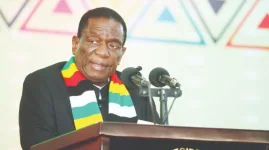President Mnangagwa has promised people with disabilities that their voices matter when creating national plans. His administration has worked since day one to improve the lives of disabled Zimbabweans through many practical programs. He discussed this yesterday during a meeting at State House in Harare, making clear his commitment to upholding everyone's dignity regardless of ability.
In June 2021, the President started a National Disability Policy to guide government actions across all areas. This policy follows United Nations standards and other international agreements Zimbabwe signed. The administration wants disabled citizens fully included in society, matching what happens in countries around the world. The President stressed that they follow the idea that nobody should be forgotten.
The government has created special departments in every ministry focused on inclusion and wellness. These departments help ensure that disability concerns get proper attention throughout public services. President Mnangagwa seemed happy that Zimbabwe's efforts align with international agreements they've adopted. He believes everyone must work together to respect disabled citizens.
Zimbabwe's Constitution already recognizes sign language as one of sixteen official languages. Public events increasingly include sign language interpreters, though the President wants even more progress. The law also requires disability considerations in all development plans. Officials have made headway in putting written materials into formats like Braille for visually impaired people. Making buildings and transportation accessible remains a major priority.
The President announced plans for more programs helping disabled Zimbabweans. He mentioned the National Disability Expo as an important event bringing together government, private companies, and community groups. This platform lets disabled citizens showcase their talents and abilities. These gatherings also foster valuable discussions about needs and opportunities.
President Mnangagwa backed up his words with cash by giving disability associations $1000 each as startup funds. He emphasized his administration wants to support disabled entrepreneurs in farming, mining, and business ventures. The President believes self-reliance matters greatly at this stage of national development. His government stands ready to help disabled business owners succeed.
The digital revolution offers new possibilities, according to the President. He urged disability organizations to create a solid database tracking their members and projects. Better information would help design more effective programs. He wants to see improved ways to measure results from these initiatives. The administration expects real changes, not just plans on paper.
President Mnangagwa praised disabled citizens for achievements made through government programs but encouraged them to build bigger enterprises. He reminded everyone about building Zimbabwe together regardless of ability. Vice President Chiwenga also spoke, celebrating progress made for disabled people. Defense Minister Muchinguri-Kashiri praised the President's dedication to including disadvantaged groups in national development.
In June 2021, the President started a National Disability Policy to guide government actions across all areas. This policy follows United Nations standards and other international agreements Zimbabwe signed. The administration wants disabled citizens fully included in society, matching what happens in countries around the world. The President stressed that they follow the idea that nobody should be forgotten.
The government has created special departments in every ministry focused on inclusion and wellness. These departments help ensure that disability concerns get proper attention throughout public services. President Mnangagwa seemed happy that Zimbabwe's efforts align with international agreements they've adopted. He believes everyone must work together to respect disabled citizens.
Zimbabwe's Constitution already recognizes sign language as one of sixteen official languages. Public events increasingly include sign language interpreters, though the President wants even more progress. The law also requires disability considerations in all development plans. Officials have made headway in putting written materials into formats like Braille for visually impaired people. Making buildings and transportation accessible remains a major priority.
The President announced plans for more programs helping disabled Zimbabweans. He mentioned the National Disability Expo as an important event bringing together government, private companies, and community groups. This platform lets disabled citizens showcase their talents and abilities. These gatherings also foster valuable discussions about needs and opportunities.
President Mnangagwa backed up his words with cash by giving disability associations $1000 each as startup funds. He emphasized his administration wants to support disabled entrepreneurs in farming, mining, and business ventures. The President believes self-reliance matters greatly at this stage of national development. His government stands ready to help disabled business owners succeed.
The digital revolution offers new possibilities, according to the President. He urged disability organizations to create a solid database tracking their members and projects. Better information would help design more effective programs. He wants to see improved ways to measure results from these initiatives. The administration expects real changes, not just plans on paper.
President Mnangagwa praised disabled citizens for achievements made through government programs but encouraged them to build bigger enterprises. He reminded everyone about building Zimbabwe together regardless of ability. Vice President Chiwenga also spoke, celebrating progress made for disabled people. Defense Minister Muchinguri-Kashiri praised the President's dedication to including disadvantaged groups in national development.












